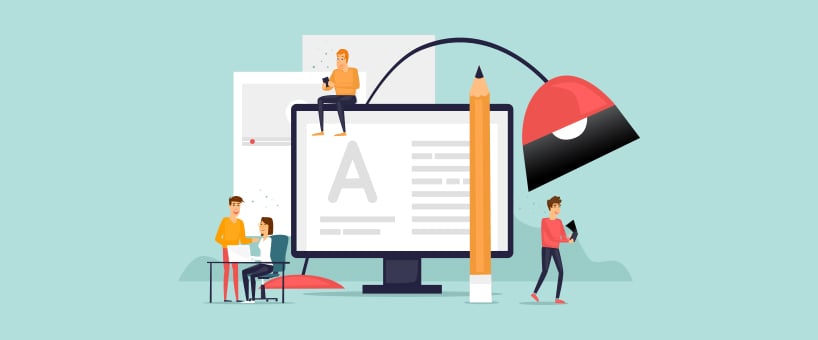Home » Academic Writing »
 May 21, 2024
May 21, 2024
Artificial intelligence has revolutionized a variety of industries, including automotive, development, digital marketing, and publishing. However, the field of education is amongst the most recent and ongoing transformations of AI and its sub-branches.
According to a study, the AI-driven education market would be valued at over $20 billion in a time frame of under 5 years. This research shows that artificial intelligence is here to stay in the education domain. Therefore, many experts have started listing down the revolutions of AI in the education sector. If you want the most updated information on it, this blog is the right place for you.
In this blog, we’ll share the role of AI and its related fields in transforming the education industry. To be more specific, we’ll talk about how artificial intelligence is enhancing the workflow in all sectors of the education business. Let’s get started without wasting any more time.
Ways AI Is Revolutionizing the Education Industry
1. Through Personalized Learning
The introduction of personalized learning is one of the major ways that artificial intelligence is transforming the education sector. AI-based platforms employ machine learning to examine students’ data, such as performance and learning patterns, and produce tailored learning pathways and suggestions. Students can utilize such systems to enhance their learning experience according to their specific requirements and interests.
2. Adaptive and Intelligent Quality Assessments
Artificial intelligence has provided instructors with a more intuitive and effective method of evaluating the work quality of their students. These days, AI-powered plagiarism detection tools, such as Duplichecker, swiftly examine a text for uniqueness by conducting a deep search. These utilities rapidly identify plagiarism in any text by comparing the scanned data to the contents of its database.
Generally, most plagiarism checkers employ the NLP (Natural Language Processing) algorithms. The systems enable these tools to determine the originality status of any piece of text. So, by adjusting to the context of the textual material, these utilities give teachers a more accurate and efficient method for determining the uniqueness of text in real time.
3. Via Administrative Automation
Administrative chores, like attendance, resource allocation, and scheduling, used to occupy a lot of time before the AI revolution. Fortunately, this procedure is becoming more efficient, thanks to artificial intelligence. These days, educators rely on AI-driven systems that automate attendance, resource allocation, and task scheduling with the help of machine learning and natural language processing. This saves educators’ time and helps them to concentrate more on teaching and student engagement. Hence, the incorporation of artificial intelligence improves the entire learning experience by strengthening the ties between educators and students.
4. Provide Smart and Enhanced Grading
One of the most important components of the overall educational system is grading. In fact, this is how teachers assess their student’s performance. However, performing all of this manually is complicated and error-prone. Fortunately, there are several AI-enabled tools available today that help simplify the grading process.
For instance, artificial intelligence automates the whole proofreading process with the invention of grammar checking softwares. These softwares enables you to check your grammar without manually reading everything. Similarly, AI-based intelligent systems analyze vast amounts of data, identify trends, and assign scores based on predetermined criteria. This improves the general fairness and dependability of the grading procedures.
5. Through Virtual Assistance
Virtual assistants are no longer limited to smart devices like Alexa, ChatGPT, Google Assistant, or Siri. To help instructors, students, and educators with a variety of activities, several educational institutions have begun incorporating AI-powered chatbots. These technologies function as intelligently as humans by utilizing Machine Learning and Natural Language Processing abilities.
For example, the AI-driven backends of state-of-the-art virtual assistants have been trained to provide prompt and appropriate responses to queries. With these systems, users can now make appointments and even access instructional materials. This quick and simple access to information streamlines the procedure and improves the overall experience.
The Conclusion:
To sum up, it won’t be wrong to claim that artificial intelligence is surely bringing a substantial transformation in the education sector. By delivering personalized learning, adaptive and intelligent tutoring, and automated administration, AI has completely revolutionized the way educators and students carry out their tasks. But we believe that this is just the tip of the iceberg. As the technologies associated with artificial intelligence are evolving daily, you can expect more astounding and mind-blowing AI-driven innovations in the upcoming years. And such a revolution will ultimately pave the way for a more effective learning and education experience.
- August 2025 (1)
- July 2025 (1)
- June 2025 (1)
- April 2025 (1)
- March 2025 (1)
- February 2025 (2)
- January 2025 (1)
- December 2024 (4)
- November 2024 (8)
- October 2024 (1)
- September 2024 (3)
- August 2024 (2)